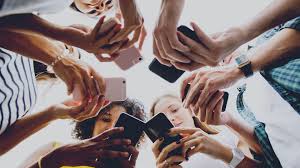Checking and scrolling through social media has been the most popular activity over the last decade. Although most of the people use it as their daily part of life or extensional way to achieve knowledge and information, a few of percentage has got deeply addicted to it. Studies have shown that the constant stream of retweets, likes, and shares from these sites cause the brain’s area to trigger the same kind of chemical reaction seen with drugs like Cocaine.
Here Catholic news shares a story of Lauren Black, a former Instagram and Facebook employee – to explain how the app has affected its users.
“I was quite anxious because every day I had to then please thousands more people,” Lauren says.
“I was on Instagram all the time. My screen time was like 13 hours a day, it was ridiculous.”
From the moment she woke up to when she fell asleep, the 26-year-old would be scrolling and liking other people’s pictures.
“I thought if I changed myself, then I would gain more followers and get all these new opportunities,” she adds.
“I just created this vision in my mind that if I went and did this, this would be the outcome. And it was a lie.”
Over Use can Make you Sick
As Lauren spent more time on the platform, her eating disorder worsened.
Lauren felt exposed to harmful content as she scrolled on Instagram because she followed and interacted with accounts that were sized four to six.
“Having an eating disorder, it’s really easy for you to fall into… a trigger hole,” she explains.
“Once I see one thing that’s triggering it is kind of easy to then go and find things that are also triggering just because that part of your brain likes it.
“Being in a trigger hole can have serious effects on what happens next in your life like I might see something and then not eat dinner.”
From dawn to dusk, Lauren would be scrolling and liking other people’s pictures.
She could find time to use it reducing her own mealtime, having a little food. That made her sick. “I basically just ignored it when I was hungry,” she says. “And when I did eat, it would just be the tiniest amount. I woke up and I was so busy with work that I just put it off for as long as possible.
“And I feel like that’s kind of like the sense of self-harm of having an eating disorder. It’s just basically starving yourself.
“When I look back on pictures now, you can clearly see that I was ill.”
Lauren eventually started treatment for her eating disorder in June 2020.
“When I started this job, I didn’t realize the impact of looking and comparing myself to other people had on my mental health,” she adds. “If I’m scrolling 13 hours a day, it’s kind of no wonder that it had a negative effect.”
Lauren is just an example out of thousands. We have to understand that do we have an addiction to social media platforms.
Are You Addicted to Social Media?
To determine if someone is at risk of developing an addiction to social media, ask these 6 questions:
- Do they spend a lot of time thinking about social media or planning to use social media?
- Do they feel urges to use social media more and more?
- Do they use social media to forget about personal problems?
- Do they often try to reduce the use of social media without success?
- Do they become restless or troubled if unable to use social media?
- Do they use social media so much that it has had a negative impact on their job or studies?
A “yes” to more than 3 of these questions may indicate the presence of social media addiction.
An estimated 27% of children who spend 3 or more hours a day on social media exhibits show symptoms of poor mental health. It is very problematic when using social media during their formation of personality.
Reducing screen time is not a herculean task if you are addicted. If it is at risk, you can seek professional help. If you have a hard time controlling your social media use and think you may be addicted. Just think about the pros and cons of it. Think that you are not alone always to get rid of this harm. Remember that doing the same thing over and over again expecting a different result is- at the very least- is illogical.



